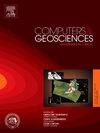利用卷积神经网络去除山区 InSAR 干涉图中的大气噪声
IF 4.2
2区 地球科学
Q1 COMPUTER SCIENCE, INTERDISCIPLINARY APPLICATIONS
引用次数: 0
摘要
在干涉合成孔径雷达(InSAR)得出的地表形变估算值中,大气噪声往往会掩盖真实的位移信号,尤其是在山区。由于气候变化对山区冰冻圈的影响尤为严重,因此在高折射地形中采用可靠的大气校正技术变得越来越重要。我们开发并实施了一种统计机器学习大气校正方法,该方法依赖于缓慢移动的冰川地貌和大气噪声的不同空间和地形特征。我们的校正应用于 InSAR 数据的原始空间和时间分辨率,不需要外部大气再分析数据,并且可以校正分层和湍流大气噪声。利用 2017 年至 2022 年的哨兵-1 号数据,我们对来自 330 张短基线干涉图的观测到的大气噪声和来自 1322 张干涉图的时间序列反演的观测到的位移信号训练了一个卷积神经网络(CNN)。我们将训练有素的 CNN 应用于校正区域外应用区域的另外 251 张干涉图,并对这些干涉图进行反演,以创建位移时间序列。我们将新墨西哥州、科罗拉多州和怀俄明州的落基山脉作为训练区、验证区、测试区和应用区。与使用大气再分析数据、与地形的相位相关性和高通滤波进行校正相比,我们的校正方法在测试数据集上的性能分别提高了 131%、208% 和 68%。经过 CNN 校正的时间序列揭示了应用数据集中以前被掩盖的岩石冰川运动学行为和其他特征。我们灵活、稳健的方法可用于校正任意 InSAR 数据,以分析一系列科学和工程应用中的微妙地表形变信号。本文章由计算机程序翻译,如有差异,请以英文原文为准。
Removing atmospheric noise from InSAR interferograms in mountainous regions with a convolutional neural network
Atmospheric noise in interferometric synthetic aperture radar (InSAR)-derived estimates of surface deformation often obscures real displacement signals, especially in mountainous regions. As climate change disproportionately impacts the mountain cryosphere, a reliable technique for atmospheric correction in high-relief terrain is increasingly important. We developed and implemented a statistical machine learning atmospheric correction approach that relies on the differing spatial and topographic characteristics of slow-moving periglacial features and atmospheric noise. Our correction is applied at the native spatial and temporal resolution of the InSAR data, does not require external atmospheric reanalysis data, and can correct both stratified and turbulent atmospheric noise.
Using Sentinel-1 data from 2017 to 2022, we trained a convolutional neural network (CNN) on observed atmospheric noise from 330 short-baseline interferograms and observed displacement signals from time series inversion of 1322 interferograms. We applied our trained CNN to correct 251 additional interferograms over an out-of-region application area, which were inverted to create displacement time series. We used the Rocky Mountains in New Mexico, Colorado, and Wyoming as our training, validation, testing, and application areas. When applied to our testing dataset, our correction offered performance improvements of 131%, 208%, and 68% in structural similarity index measure over corrections using atmospheric reanalysis data, phase correlation with topography, and high-pass filtering, respectively. The CNN-corrected time series reveals previously obscured kinematic behavior of rock glaciers and other features in the application dataset. Our flexible, robust approach can be used to correct arbitrary InSAR data to analyze subtle surface deformation signals for a range of science and engineering applications.
求助全文
通过发布文献求助,成功后即可免费获取论文全文。
去求助
来源期刊

Computers & Geosciences
地学-地球科学综合
CiteScore
9.30
自引率
6.80%
发文量
164
审稿时长
3.4 months
期刊介绍:
Computers & Geosciences publishes high impact, original research at the interface between Computer Sciences and Geosciences. Publications should apply modern computer science paradigms, whether computational or informatics-based, to address problems in the geosciences.
 求助内容:
求助内容: 应助结果提醒方式:
应助结果提醒方式:


